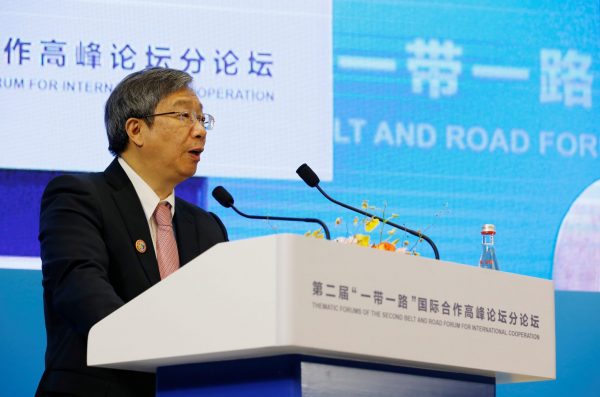Yet government intervention in the financial system remains widespread and serious. The People’s Bank of China (PBoC) still guides commercial banks’ setting of deposit and lending rates through ‘window guidance’. Industry and other policies still play important roles influencing the allocation of financial resources. The PBoC intervenes in foreign exchange markets from time to time, through directly buying or selling foreign exchanges, setting the central parity and determining the daily trading band. Regulators tightly manage cross-border capital flows and the state still controls the majority shares of most large financial institutions.
Repressive financial policies attract criticism in academic, business and policy circles. Academics believe state intervention reduces financial efficiency and inhibits financial development. Private businesses complain about policy discrimination, making it difficult for them to obtain external funding.
China’s repressive financial policies have also been a source of controversy as they relate to its outward direct investment. Some foreign experts argue that Chinese state-owned enterprises (SOEs) compete unfairly with foreign companies since they receive subsidised funding. This issue is at the centre of the current trade dispute between China and the United States.
Despite all these issues, for quite a while repressive financial policies have not stopped China from achieving rapid economic growth and maintaining financial stability. During its first three decades of economic reform, China’s GDP growth averaged 9.8 per cent per annum and its financial system did not experience any systemic financial crisis.
During the past decade, that rosy picture has faded away. Economic growth has decelerated and systemic financial risks have escalated sharply. It appears that what worked before no longer continues to work so well.
China’s financial reform and development over the past four decades could be described as strong in establishing financial institutions and growing financial assets, but weak in liberalising financial markets and improving corporate governance. On the one hand, having started with just one financial institution in 1978, China has built an expansive financial sector with a range of institutions and vast financial assets. On the other hand, free-market mechanisms remain seriously constrained.
In the reform period, repressive financial policies were legacies of the central planning system. Their continuation was initially the result of political compromise. It was politically not feasible to privatise all the SOEs, so the government had to intervene in the financial system, providing de facto subsidies to the SOEs to support a smooth economic transition. In retrospect, during the first couple of decades of reform, repressive financial policies resulted in improved economic performance and supported financial stability.
Repressive financial policies can have positive effects on economic growth and financial stability during early stages of development. But over time, these positive effects are likely to turn negative.
The impact of financial repression can be thought of in terms of two effects: the McKinnon effect and the Stiglitz effect. The McKinnon effect is generally negative — financial repression hinders both financial efficiency and financial development. The Stiglitz effect is mainly positive — repressive financial policies can help effectively convert savings into investment and support financial stability.
Both effects exist in all economies but their relative importance varies. The positive Stiglitz effect is more important when both the financial market and regulatory system are underdeveloped. This validates the observation that financial repression did not disrupt rapid economic growth and financial stability during China’s early reform years.
In recent years, repressive financial policies have begun to hurt China’s economic and financial performance. Economic growth has decelerated persistently since 2010. One reason is that, as an upper middle-income economy, China’s growth now relies more on innovation and industrial upgrading instead of mobilising more labour and capital. Repressive financial policies are not well positioned to support corporate innovation. Nor are they well suited to provide asset-based income for Chinese households.
In the meantime, systemic financial risks have risen. The two most important pillars supporting financial stability — sustained rapid economic growth and the government’s implicit guarantees in the financial sector — have both weakened discernibly. This suggests the policy regime that worked effectively during the first few decades of reform can no longer deliver the same results. Today, further reforms are urgently needed to support future growth and stability. Reform needs to focus on developing multilayer capital markets, letting market mechanisms play the decisive role in allocating financial resources and improving financial regulation.
In economies where financial markets and regulatory systems are underdeveloped, a certain degree of financial repression can be helpful. If China gave up all government interventions at the start of its reform period, it would have experienced several rounds of financial crises.
In this sense, repressive financial policies in China are transitory measures. They are effective ways of supporting economic growth and financial stability, and are part of a gradualist approach to reform. But the Chinese government now needs to push ahead with more challenging financial reforms, increasing the role of the market and opening the financial sector to the outside world.
Yiping Huang is the Jin Guang Chair Professor of Economics, Deputy Dean of the National School of Development and Director of the Institute of Digital Finance at Peking University, Beijing.
Tingting Ge is a PhD scholar at the National School of Development, Peking University.
This article appeared in the latest issue of East Asia Forum Quarterly — ‘Chinese realities’ — Vol. 11, No. 2.

